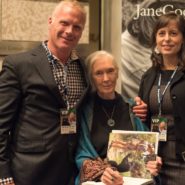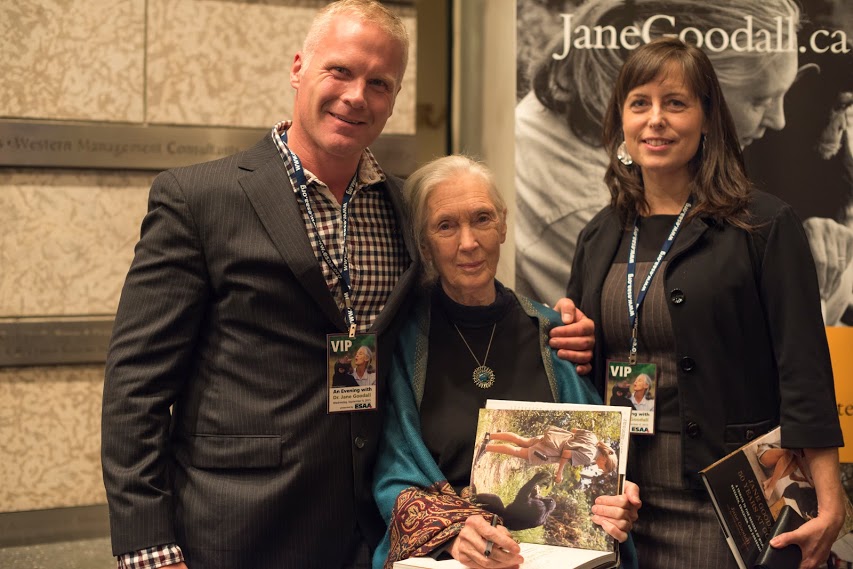
In the fall of 2015, I gave a lecture, organized by the Jane Goodall Insititute-Canada, in Edmonton, Alberta—part of my almost non-stop tour around the globe. After my talk, there was a book signing and, as usual, a long line of people formed, waiting to have a few words, get an autograph and have a photo taken.
There was one person in that line, however, who had a different agenda—Spencer was desperate to tell me about an infant chimpanzee named Manno, who was on display at a zoo in northern Iraq. His keepers were not unkind, Spencer told me, but they had little understanding of Manno’s needs. Chimpanzees, like us, are social animals with close family bonds. Manno should have been with his mother and other members of the community. Yet he was the only chimpanzee in the zoo, and only came out of his tiny cage to be photographed with visitors, dressed in human clothes. It was clearly no life for the infant chimpanzee. Moreover, war raged less than 100 kilometres away in Mosul where forces were battling the Islamic State.

Spencer had made it his mission to rescue Manno from this inappropriate setting. Of course, Mano could not be returned to the wild, where he belonged, but he could go to a sanctuary where he could socialize with other orphaned chimpanzees, climb trees, and eat a healthy diet. If only we could get permission from the zoo. And a permit from the CITES authorities to enable him to travel back to Africa. And raise the money necessary for such a venture. A daunting series of challenges, but I could tell that Spencer was a very determined person
It was a strange experience, to be sitting in a book signing line in North America talking to a high school teacher about how to transport an infant chimp from war-torn Iraq to a sanctuary in Africa! Of course I told him I would do all that I could to help. JGI-Canada put Spencer in touch with Daniel Stiles, project manager for the Project to End Great Ape Slavery.
Eventually, thanks to the efforts of Daniel and many other concerned people, Manno was indeed transported to Sweetwaters Chimpanzee Sanctuary in Kenya, a sanctuary that I had worked to establish. It is situated within the Ol Pejeta Conservancy that encompasses 90,000 acres of savanna habitat. There, Manno was gradually introduced to one of the groups that now consider Sweetwaters as home—although a home very different from the tropical forests from which most of the orphans had originated.
Sanctuaries like Sweetwaters are vital in the efforts to end the illegal trade in great apes, taken from the wild to be sold as pets or for entertainment in circuses, movies, and advertising. Manno is just one of the many victims of this trade. All were snatched, terrified and traumatized, from the dead or dying bodies of their mothers. Other members of the community often try to intercede, and they too may be killed by the poachers.
Animal trafficking is taking hundreds of great apes from the wild every year, most of them chimpanzees. Once there were up to two million chimpanzees ranging across twenty-five African nations, but due to habitat loss, the bushmeat trade, and poaching there are no more than between 200,500 and 300,000 today, and they have become locally extinct in four countries. Many of those that remain are living in small isolated groups, cut off from other chimpanzees as a result of the destruction of their forest habitats, with little hope of long term survival. One of the most urgent conservation measures being tackled today is creating corridors enabling these isolated groups to once again make contact with others and exchange genetic material, thus preventing inbreeding.
The Jane Goodall Institute is working with other organizations, communities, and individuals like Spencer to end trafficking. We run two sanctuaries for rescued chimpanzees. Our Tchimpounga Chimpanzee Rehabilitation Center in the Republic of Congo is the largest in Africa. Since its doors opened in 1992, we have protected and cared for more than 200 chimps, all victims of illegal trade. The other is Chimp Eden in South Africa.
But sanctuaries are not enough to put a stop to the illegal trade in wildlife. To save chimpanzees—or elephants or rhinos or the many iconic species now pushed to the brink of extinction—we must alleviate poverty. People need alternative and sustainable sources of income so that they no longer need to kill wildlife simply to meet basic needs—for food or to sell for money.
All of us have a role to play. Demand for pets, trinkets, and souvenirs fuels the worldwide illegal animal trade through which billions of dollars flow. Trafficking wild animals or their body parts would become increasingly less worthwhile if the demand dropped. This is why JGI and other conservation NGOs are launching awareness campaigns in the countries that buy wild animals as pets, for entertainment, for ivory carvings, or in the belief that some body parts—such as rhino horn, pangolin scales, tiger bones, and shark fins—have medicinal value. It is the young people who are helping that give me the most hope. JGI’s environmental and humanitarian program for young people from kindergarten through university is now in almost eighty countries. And these young people, along with other similar youth groups, are working to educate their families, friends, and the general public about the cruelty involved in wildlife trafficking and how it is driving some species towards extinction.
How often I hear, when people are talking about conservation, “Think globally; act locally.” But if we think of the trafficking of wildlife around the world, we are overwhelmed by the enormity of the task and tend to give up. Instead, we should tackle a problem that we can do something about. Like Spencer, who not only enabled one little chimpanzee to move from a lonely life of servitude to a very different life with a group of his kind, but illustrates that one individual can, indeed, make a difference.
For me, my small part in this story came full circle when, during a recent visit to Sweetwaters, I was introduced to Manno. I was able to throw him an orange through the electric fence that keeps the chimpanzees in their spacious enclosure and keeps predators out. I heard his contented grunts as he consumed the sweet flesh. And I watched as he bounced towards one of his new friends, listened to their breathy laughter as they tickled each other. Manno was at home, and I wished I could have shared these moments with Spencer. Because, but for Spencer, who was able to persuade many dedicated people to play a role in his rescue, Manno would, almost certainly, still be a prisoner, miserable and alone, in far-off Iraq. Slowly, his spirit would have been broken as he sat with dull blank eyes, staring into space. Would another Spencer have found him and determined to rescue him? There is always hope.
I urge you to read this inspirational story of one ordinary man who did something extraordinary and the mischievous chimpanzee who changed his understanding not only of chimpanzees, but the other amazing animals with whom we share this world and the importance of saving them before it is too late.
Jane Goodall, PhD, DBE
Founder of the Jane Goodall Institute & UN Messenger of peace
Recent Comments